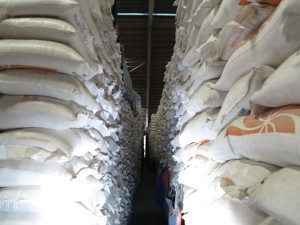PH rice stock fell by 15% to 2.12M MT in January
MANILA, Philippines—The Philippines’ rice stock as of Jan. 1 dropped by about 15 percent to 2.12 million metric tons (MT) from the previous month’s 2.49 million MT, according to the Bureau of Agricultural Statistics.
The new year inventory was also about 16 percent lower than the volume recorded on the same day of 2013, the BAS said.
The supply may cover 62 days of consumption—11 days less than what was reported in the beginning of December.
Based on the government’s measure of rice self-sufficiency, supply must exceed yearly demand by 90 days’ worth of buffer stock.
Households are reported to account for three-fifth of the total rice stock—enough to last for 37 days.
Commercial warehouses accounted for about 23 percent, or 17 days’ worth of stock.
Households kept 1.27 million MT, while commercial warehouses had 580,000 MT.
The National Food Authority held 270,000 tons—about 13 percent of total stock and good for eight days.
The NFA is mandated to maintain a buffer stock that should last for 15 days. The national consumption rate stands at about 34,000 MT a day.
By the start of 2014, the NFA contracted Vietnamese suppliers for a supply of 500,000 MT to top up its stock. Part of the NFA’s rice stock went to relief efforts for typhoon victims.
The shipments have since been coming in, enabling the NFA to replenish supplies of subsidized rice in retail stores.
On Jan. 31, the grains agency said it raised the volume of rice allocated to accredited retail outlets in the so-called hotspots of Metro Manila, particularly in the markets at Kamuning, Frisco and Muñoz.
The allocation was doubled to 50 bags a day for outlets in marketplaces, and to 20 bags elsewhere.
“This is being done to augment the supply of lower-priced rice in the market so consumers will have access to more affordable stocks,” the NFA said in a statement.
Regular milled and well-milled NFA rice are being sold at P27 and P32 per kilo, respectively.

